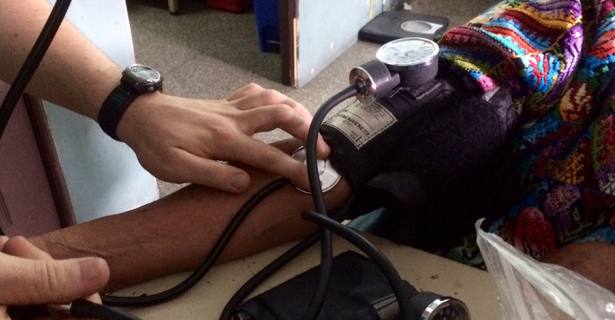A short description of Xela would tell you that this relatively large city in the western highlands of Guatemala, is settled between active volcanos and a number of indigenous towns and is known for its vibrant culture. This may not be the prototypical imagery that one would conjure when considering a hub for successful and educational social entrepreneurship models, but it was here I came to work with Asociación Pop Wuj, partner with Tufts Timmy Global Health. I am learning modern Guatemala is a country full of contradictions, anyway.
Pop Wuj designs and implements community development projects in Xela and the surrounding area to address local needs through sustainable efforts. To fund its work, Pop Wuj runs a language school essentially as a product, using the capital from its tuition to provide social programming – i.e. the medical clinic, nutrition program, scholarships, safe stoves, and family support – to the residents of its community. My main goals in working with Pop Wuj were to practice cultural competency in patient care, to explore how Pop Wuj faces the challenges of providing care in a resource-limited setting, and to implement what I learn from Pop Wuj in the Tufts community and beyond.
Before touching on medical Spanish, before refreshing triage skills, before even seeing the clinic, Pop Wuj starts new students with a week-long cultural competency curriculum, taught by owner and anthropologist Roney. Our patient care preparation delved deeply into the ways colonialism and capitalism shaped Guatemala as it is today. We were given an historical understanding of Mayan medicine – how highly advanced it had been, and how this was overlooked because it was not deemed “scientific” by Western standards – as well information on indigenous Mayan cosmovision and perspective on wellbeing and balance in foods. Roney brought the points together to describe their influence on power struggles in modern medicine: from her perspective, Western colonialism has led to systematic poverty and racism that in turn causes the present lack of access to care and medicine experienced by Xela’s most vulnerable populations.
Physically starting in the clinic shed light on the importance of this immersive introduction. My work has been to record patient histories, measure vitals, translate consultations, and help fill prescriptions. Considering differences in cultural understanding influences every part of this work. Most of our patients travel from rural indigenous communities by public bus, a potentially long journey taken with children tied to her back. Despite Pop Wuj’s low or absent cost, accessing the clinic can still be a challenge. By taking histories, vitals, and translations, I saw how I could appear unduly knowledgeable to our patients. These jobs alternatively provided a way for equalizing discussions. Patient care is direct and honest – asking someone how they feel can open a two-way channel of trust and communication. This dialogue also highlights the direct health impacts of the problems Roney mentioned. Diabetes and hypertension are common ailments and stunted growth is widely observed, results of lifestyles heavy in labor and light in nutrition. Providing the medicines necessary for treatment from our pharmacy, free of charge, becomes that much more important, and running out of the last donated bottle of vitamins that much more frustrating, knowing chances a patient will buy the rest of a prescription elsewhere are low.
In the second half of my time here, after having gotten to know Pop Wuj and Xela, I am ready to open more room for discussion. There are many layers of complexity involved with their work, and I want to be able to synthesize what I hear, observe, and do, to best relay their impact to my peers and Timmy chapter.

